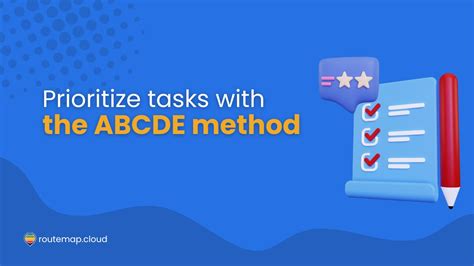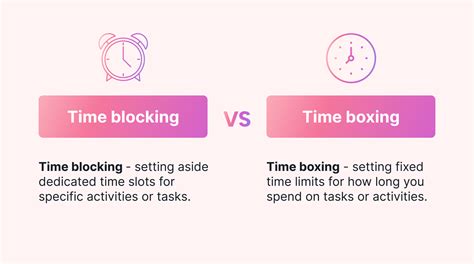Do you often find yourself struggling to make the most out of your time? Are you constantly juggling multiple tasks and feeling overwhelmed? It's time to take control and maximize your productivity. Discover the secret to effective time management by incorporating these five essential techniques. By implementing these strategies, you will unlock your potential and achieve your goals with ease.
Firstly, prioritize your tasks wisely. By identifying the most important and urgent tasks, you can ensure that your time is allocated efficiently. Utilize the Eisenhower Matrix, a tool that categorizes tasks based on their urgency and importance. By focusing on tasks that fall under the "Important and Urgent" quadrant, you can tackle critical tasks head-on and prevent them from adding unnecessary pressure later.
Secondly, embrace the power of setting clear goals. Without a defined objective, your time can be easily wasted on unimportant activities. Clearly establish what you aim to achieve, whether it be completing a project or reaching a personal aspiration. Set both short-term and long-term goals, and break them down into smaller, manageable steps. This approach ensures that your time is spent purposefully and that you are steadily making progress towards your desired outcome.
Thirdly, develop effective organizational skills. A cluttered workspace can hinder your productivity and increase stress levels. Invest time in organizing your environment, whether it be arranging files and documents or decluttering your digital space. Establish a system that works for you, such as color-coding, labeling, or using digital tools. By maintaining an organized space, you can minimize distractions and improve focus, allowing you to complete tasks efficiently.
Fourthly, embrace the power of saying 'no.' Often, we tend to overcommit ourselves, fearing that refusing a request or invitation may lead to missed opportunities or damaged relationships. However, by learning to say 'no' when necessary, you can protect your time and energy. Prioritize your own goals and commitments, and remember that it is essential to maintain balance and avoid stretching yourself too thin. Saying 'no' allows you to focus on what truly matters and ensures that your time is utilized effectively.
Lastly, cultivate the habit of self-care. It may seem counterintuitive, but taking care of your physical and mental well-being directly impacts your productivity. Engage in activities that rejuvenate you, such as exercising, practicing mindfulness, or spending time with loved ones. Allow yourself breaks throughout the day to recharge and avoid burnout. By prioritizing self-care, you are replenishing your energy levels and optimizing your ability to manage time effectively.
By incorporating these five essential strategies into your daily routine, you will witness a significant improvement in your time management skills. As you prioritize tasks, set clear goals, organize your environment, assertively say 'no,' and prioritize self-care, you will find yourself achieving more with less effort. Take control of your time, boost your productivity, and reach your goals with confidence.
Prioritize Tasks for Maximizing Efficiency

In order to optimize productivity and efficiently manage your time, it is essential to prioritize tasks effectively. By determining the importance and urgency of each task, you can allocate your time and resources accordingly, ensuring that you are focusing on the most crucial activities that will bring you closer to achieving your goals.
| 1. Categorize Tasks | Classify your tasks into different categories or levels of importance, such as high priority, medium priority, and low priority. This classification will help guide your decision-making process when it comes to allocating your time and resources. |
| 2. Set Clear Deadlines | Establishing clear deadlines for each task will bring a sense of urgency and ensure that you stay on track. When setting deadlines, consider the level of priority for each task and allocate an appropriate amount of time to complete it. |
| 3. Evaluate Consequences | Consider the potential consequences of not completing certain tasks on time. By evaluating the impact that delayed or unfinished tasks may have on your progress, you can make informed decisions about which tasks should be prioritized and completed first. |
| 4. Utilize Time Blocks | Organize your day into specific time blocks dedicated to different tasks or categories. By assigning fixed periods for focused work on high-priority tasks, you can avoid distractions and ensure that you are effectively utilizing your time and energy throughout the day. |
| 5. Reassess and Adjust | Regularly reassess your task priorities based on changing circumstances and new information. Flexibility is key in effective time management, so be open to adjusting your priorities as needed to ensure that your efforts are aligned with your goals. |
By prioritizing tasks in a systematic manner, you can enhance your productivity, maintain focus on important activities, and ultimately achieve your goals in a more efficient and timely manner.
Set SMART Objectives and Divide Them Into Manageable Tasks
When it comes to achieving success in managing your time effectively, setting clear and measurable goals is crucial. SMART objectives provide a framework to define your goals in a detailed and specific manner. By breaking down these objectives into smaller, manageable tasks, you can stay focused, prioritize effectively, and track your progress more efficiently.
1. Specific: Clearly define what you want to achieve. Use descriptive language to outline the desired outcome and avoid vague statements that leave room for interpretation.
- Example: Instead of setting a goal to "improve productivity," specify a target such as "increase productivity by 20% within the next three months."
2. Measurable: Establish criteria to measure your progress. Quantify your goals whenever possible, as it enables you to track your advancements and stay motivated.
- Example: Rather than aiming to "complete more tasks," set a measurable goal like "complete at least five tasks each day."
3. Achievable: Ensure that your goals are realistic and attainable. Consider your available resources, skills, and time constraints, and set goals that stretch your abilities without being unattainable.
- Example: Instead of aiming to "learn a new language fluently in a month," set a more achievable goal such as "learn the basics of a new language within a month."
4. Relevant: Align your goals with your long-term vision and overall objectives. Prioritize goals that are meaningful and relevant to your growth, both personally and professionally.
- Example: Rather than setting a goal unrelated to your career path, focus on objectives that directly contribute to your professional development.
5. Time-bound: Set specific deadlines for your goals. Having a timeframe creates a sense of urgency and helps you stay accountable, preventing procrastination.
- Example: Instead of setting an open-ended goal like "start a personal project," set a time-bound goal such as "start a personal project within the next two weeks."
By setting SMART objectives and breaking them down into manageable tasks, you can enhance your time management skills and increase your chances of successfully reaching your goals.
Identify and Eliminate Time Wasters

Unveiling the culprits that steal your precious time is essential for optimizing productivity and achieving your goals. By recognizing and eliminating these time wasters, you can regain control over your schedule and prioritize tasks effectively.
1. Distractions and Interruptions: It's paramount to identify and limit distractions that hinder your focus and productivity. Whether it's excessive social media use, emails notifications, or colleagues popping by for a chat, implementing strategies to minimize interruptions is crucial.
2. Poor Planning: Inadequate time management often stems from insufficient planning. By establishing a clear roadmap for your day, week, or even month, you can allocate time effectively, set realistic deadlines, and avoid the last-minute rush that often leads to poor-quality work.
3. Procrastination: The habit of delaying important tasks can drain your time and energy. Identifying the root causes of procrastination, like fear of failure or lack of motivation, is the first step towards overcoming them. By breaking tasks into smaller, manageable portions and setting deadlines, you can combat procrastination effectively.
4. Multitasking: Although often glorified, multitasking can actually be a time waster. Switching between tasks frequently leads to decreased focus, reduced efficiency, and increased likelihood of errors. Prioritizing tasks, focusing on one thing at a time, and utilizing time blocks for specific activities can help eliminate the inefficiencies caused by multitasking.
5. Poor Delegation: Failing to delegate tasks effectively can result in time-consuming and overwhelming workloads. Identifying tasks that can be handed off to others, assigning responsibilities based on skills and availability, and providing clear instructions can help you free up valuable time and concentrate on essential tasks.
By identifying and eliminating these time wasters, you can optimize your time management skills, boost productivity, and ultimately reach your goals efficiently.
Delegate and Outsource to Save Time
Efficiently managing your time and achieving your goals requires more than just personal effort. One key strategy to maximize your productivity is to delegate tasks and outsource responsibilities to others. By entrusting specific tasks to capable individuals or external resources, you can save valuable time and focus on the essential aspects of your work.
Delegation involves assigning tasks to individuals within your team or organization who possess the necessary skills and knowledge to complete them effectively. By distributing responsibilities to competent team members, you can free up your time to concentrate on high-priority activities that require your expertise or attention. Not only does delegation save time, but it also fosters a collaborative environment and empowers your team members to develop their skills and take ownership of their work.
Outsourcing, on the other hand, involves entrusting certain tasks to external professionals or agencies. Whether it's hiring freelancers, contracting specialized firms, or utilizing virtual assistants, outsourcing can bring significant benefits. It allows you to tap into a vast pool of expertise, access specialized services, and offload time-consuming tasks, such as administrative work or technical support. By delegating these tasks to external entities, you can focus on core activities, enhance productivity, and improve overall efficiency.
However, when considering delegation or outsourcing, it's crucial to assess the nature of the task and carefully select the individuals or agencies you collaborate with. Clearly define the objectives, expectations, and timelines to ensure a smooth workflow and satisfactory outcomes. Effective communication and regular follow-ups are vital to monitor progress and address any challenges promptly.
In conclusion, delegating tasks and outsourcing responsibilities are essential strategies for effective time management. By entrusting tasks to capable individuals or specialized agencies, you can save time, enhance productivity, and focus on critical activities that align with your goals. Embracing delegation and outsourcing not only improves efficiency but also empowers your team members and allows you to leverage external expertise, ultimately driving your success.
Practice Efficient Time Blocking and Time Boxing Strategies

Effectively managing your time is crucial for enhancing productivity and achieving your objectives. One approach to optimize your time usage is through the implementation of efficient time blocking and time boxing techniques. These strategies involve dividing your schedule into dedicated time blocks and setting specific durations within which to complete tasks.
By utilizing time blocking, you allocate specific periods for various activities, ensuring that you focus solely on one task at a time. This approach eliminates distractions and helps maintain concentration, leading to increased efficiency. Time boxing, on the other hand, involves setting fixed timeframes to complete tasks. By working within these predetermined windows, you create a sense of urgency and enable yourself to accomplish more in less time.
Employing effective time blocking and time boxing techniques allows you to prioritize your activities, allocate sufficient time for essential tasks, and avoid unnecessary time wastage. By breaking your day into dedicated intervals and adhering to a strict schedule, you can better manage your workload and make consistent progress towards your goals.
A key benefit of time blocking and time boxing is the ability to manage distractions effectively. By setting aside specific periods for focused work, you can limit interruptions and improve concentration. Additionally, these techniques provide a structured framework to plan and allocate time for activities that contribute directly to your objectives, ensuring that you stay on track and maintain momentum.
Furthermore, incorporating these strategies into your routine helps you monitor and evaluate your time usage. By reviewing how you utilize each time block, you can identify areas that require improvement, evaluate your productivity levels, and make necessary adjustments. This practice enables you to refine your time management skills continuously, leading to increased productivity and the achievement of your goals.
In conclusion, implementing efficient time blocking and time boxing techniques plays a crucial role in optimizing your time management skills. By employing these strategies, you can enhance productivity, eliminate distractions, prioritize tasks, and maintain focus. Regular practice and evaluation of these methods will enable you to refine your approach and achieve your desired outcomes efficiently.
FAQ
How can effective time management boost productivity?
Effective time management can boost productivity by helping individuals prioritize tasks, set realistic goals, and allocate sufficient time to complete them. By managing time efficiently, people can minimize distractions, stay focused on important tasks, and accomplish more.
What are some practical tips for effective time management?
Some practical tips for effective time management include creating a to-do list, prioritizing tasks based on importance and urgency, breaking larger tasks into smaller, manageable portions, utilizing time blocking techniques to allocate specific time slots for different activities, and eliminating or minimizing distractions such as excessive smartphone usage or social media browsing.
How can I improve my time management skills?
To improve time management skills, it is important to first analyze how time is currently being used. This can involve keeping a time log to track activities and identify areas where time is being wasted. Setting clear goals and creating a schedule or routine can help in managing time effectively. Additionally, using productivity tools or apps, learning to delegate tasks, and practicing discipline can all contribute to improving time management skills.
What are the benefits of effective time management?
Effective time management has numerous benefits. It can reduce stress levels, increase productivity, improve work-life balance, enhance focus and concentration, and allow individuals to accomplish their goals in a more efficient manner. It can also provide a sense of satisfaction and fulfillment as tasks are completed in a timely and organized manner.
How can I overcome procrastination and manage my time better?
To overcome procrastination and manage time better, it can be helpful to identify the underlying reasons for procrastination, such as fear of failure or perfectionism, and find ways to address those issues. Breaking tasks into smaller, more manageable steps and setting deadlines can also be effective. Additionally, creating a supportive environment, seeking accountability from others, and practicing self-discipline can assist in overcoming procrastination and improving time management.



